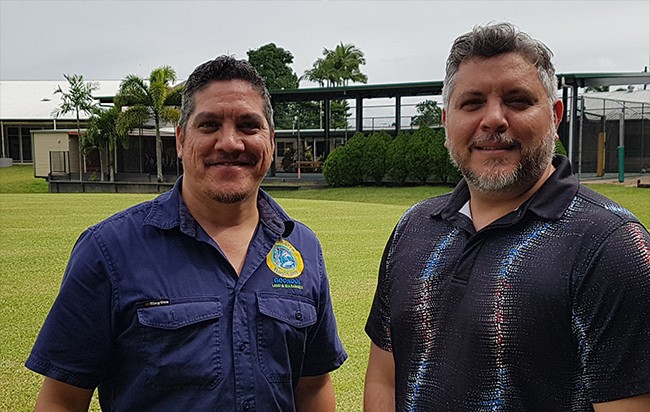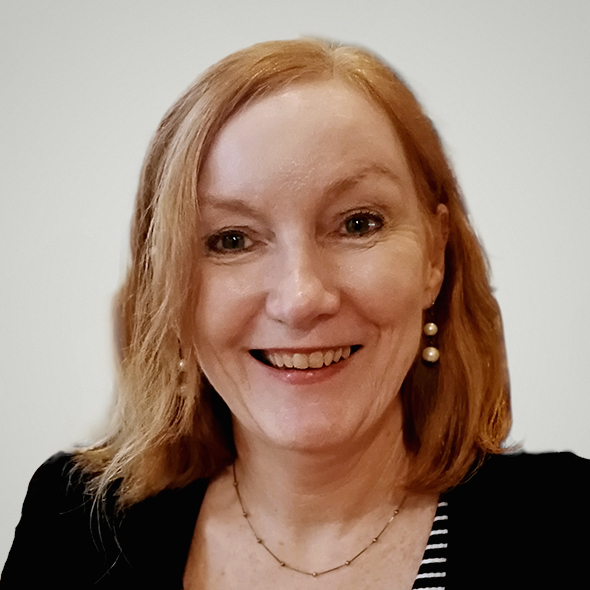Deep in the heart of steamy north Queensland, on the Cassowary Coast, a small First Nations school is achieving big things and changing young lives for the future.
He has fought many battles in his years of leadership at the Radiant Life College in Innisfail, located on the Cassowary Coast just south of Cairns. But for Radiant Life College principal and CEO Nathanael Edwards MAICD, one of the biggest was to fight for funding in 2019 for a permanent building on the Independent Christian school site.
All the education authorities wanted to offer was a temporary demountable building or “donga”. “But we decided blackfellas are better than that. We fought for the right to have a fixed building,” said Edwards. “That was the heartache. That was the struggle.
“Every time we knocked on the door, their answer was to just buy a demountable. But when you have integrity in your life or you have passion, you are better than that.
“Our kids are better than that. We see them worthy to sit in something that's created for them solely for their development. So that was a win that we took to our school board.”
The $1.9 million funding application for the building was awarded after many years of work. “It showed that a local group of First Nations people have tenacity and resilience….. They wanted something permanent for future generations.”
A dream come true
The First Nations school, set up in 1983 with 30 students, now has nearly 100 who attend until Year Nine, including four white students. It was founded by the local First Nations church, Tabernacle of Yeshua Ministries, and is the realisation of a long-held dream by Edwards’ great-grandmother, Anna Edwards.
“She was one of the founding members of the first Indigenous churches in Innisfail. Her desire and aspiration was for her people to have a place that could accommodate their spiritual journey in a respectful manner. Back then we have to realise there was still segregation. It was still a time when whites and blacks weren't mingling.
“Therefore she had a passion and desire to provide a safe place for First Nations people to worship and hence the purchase of the property by First Nations people from a local cattle farmer. First Nations people cultivated the land and put buildings on the property… and they had a desire then to create a safe place for their First Nations children to gather peacefully in a respectful area.”
Forty years later, the school is setting a new standard for First Nations education that other Australian schools are emulating.
The school was originally set up to cater for the needs of a number of first Nations children who were disengaged from local education institutions, but now it also enrols white children as well.
First Nations school attendance rates are well below average across the nation but at Radiant Life College, attendance rates are high at between 86 to 98 per cent, due to services provided such as free school bus transport, free breakfasts provided by the local church, free lunches and Indigenous Land and Sea Rangers mentoring as well.
Some former students have gone onto university studies and trades careers.
“We are seeing wins in the areas of numeracy and literacy,” says Edwards. “This all comes with the attendance rate of a student. It holds a lot of weight as to how a child will develop through their schooling. So allowing these kids an opportunity and taking away the barriers or hurdles that the family may face is the biggest win or success story.”
Challenges
One of the most frustrating challenges in running the school is recruiting suitable teachers who will stay longer than a couple of years, according to Edwards, who says he deals with this on the school board at a planning level.
Nationwide, there is a shortage of teachers, but regional areas find it especially difficult to recruit staff, as some stay in the role only six months to two years and then leave, he says.
“When you have a life cycle of teachers averaging two-and-a-half years, you have to be very strategic and meticulous in how you plan those operations. Sometimes that can hinder your growth in planning.”
Some Australian private schools are offering two years’ salary as an incentive to new staff, however this small school in Innisfail finds it hard to compete, despite offering a unique tropical life immersed in First Nations culture. “All I can offer is cassowaries and crocodiles and snakes and spiders and endless rain,” jokes Edwards.
But on a serious note, he adds that some Australian schools are now learning from the unique education model that Radiant Life College offers for First Nations education, so teachers can take this learning back to capital cities and other locations as specialised experience.
Another major challenge was the COVID pandemic, which left the school unable to complete a planned building project. As building costs have now doubled, the school and its board must now deal with the prospect of raising further funds to execute the plan for a new building to house 50 extra students.
“We were granted $750,000 in 2019 by the Queensland government,” says Edwards. “Unfortunately, we came into two years of tumultuous times with the pandemic, so we had to put everything on the backburner during that time. Since then, all costs have gone up by 40 to 50 per cent.”
Once the building is complete, the school will then apply for accreditation to expand to Year 12 its enrolments.
Generational change and the importance of Elders
Edwards says the input of local Elders into the school community is vital.
“The local churches are run by local traditional Elders. So you get that spiritual culture knowledge and positive role models. Some of these kids are coming from broken homes that might not have Mum and Dad or Nan and Pop any longer. And here the Elders are filling a void.
“Here the kids are seeing a senior Elder as a grandad, as someone who they can trust….If I put a dollar value on this, it would be priceless due to the passing down of information and knowledge of our culture to the next generation that is not readily available in textbooks.”
He says Elders in the community want to see the young children of today have better lives than they experienced. “What we're trying to do is instill an identity to allow our students to discover their identity through their culture. And we provide that environment. We provide it by allowing them to explore that connection to history, connection to who they are, a connection to leadership, to what that means, and what that looks like.
“And hopefully it projects them onto a path that's greater than our Elders have had or who we are right now. That's one of the most important things when we sit down and share with the Elders. They don't want to see the kids end up where they themselves are at. They want to see the kids have a better life.”
He says institutions need to play a greater part in fostering reconciliation and attitudinal change on racism for the future. “When are we going to start to hold accountable the institutions that are authorised to teach the next generation?” he says.
“What information are we enabling them to have access to, to enlighten the next generation? We can only do so much, but institutions have to play a greater part.”
Radiant Life College is attempting to change the cycle through early intervention. “If we can take a look at early intervention within our education setting and allow people to experience our culture respectfully, but hopefully, then their children's children might be able to sow the seeds of understanding, empathy, diversity and inclusion.”
How the CEO works with the board
Edwards is a member of the AICD Reconciliation Action Plan (RAP) committee, chair of the Mamu Aboriginal Corporation and Director of the Mamu Health Service and sits on the regulatory board for the Residential Tenancies Authority of Queensland.
He says he works closely with the Radiant Life College school board. “My role is I'm accountable to the board for daily operations. I also try to articulate the aspirations of the board and to bring an understanding of what's happening daily. I allow them to sample operations, wins and losses and draw a fine line between management and governance. That's always a tango dance for any CEO /principal who works with or part of a board.”
The Radiant Life College school board was restructured in 2013 with a constitution and now oversees an annual school budget of about $3 million. Four board members oversee compliance and regulations and set the direction for strategic planning and support Edwards with guidance and the tools to implement strategic plans.
Board members include Edwards, John Fejo team leader Goondoi Rangers, youth leader Jordan Rudkins and former Queensland Health nurse manager Ann Barber.
“The board's there to ensure that the compliance and regulatory criteria is met, but also to allow them to have their fingers on the pulse and not strangle. It's really that fine line of respect and understanding.”
Pictured: Dancers rehearsing for NAIDOC Week celebrations. And Radiant Life Principal and CEO Nathanael Edwards (right) and Radiant Life College board chairman Pastor Manni Edwards.

How I view Eldership within my culture: Nathanael Edwards MAICD
Elders possess a wealth of traditional knowledge that is essential for preserving our cultural heritage. They are living libraries, holding within them the stories, teachings and rituals that define our identity as a nation. Their presence and wisdom provide us with a deep understanding of our history, language and spirituality, allowing us to maintain a strong sense of cultural continuity connecting us to Jilbay Bulurra (Experiencing the Dreaming).
Elders embody selfless and servant leadership qualities that are deeply rooted in our Indigenous culture. Their role extends beyond their advanced age, by placing the needs of their community above their own, acting as pillars of support and wisdom. Their primary focus is on betterment of the collective, ensuring that cultural traditions and values are preserved for future generations and exemplify the essence of servant leadership.
Elders are the bridge between the past and the future. They play a vital role in passing on their knowledge and teachings to younger members of their community, ensuring the survival of our cultural practices for generations to come. Their presence instils a sense of pride and identity, fostering a strong cultural connection that strengthens our community bonds.
In conclusion, Elders are the pillars of Indigenous culture. Their profound wisdom, guidance and teachings are integral to preserving our heritage and fostering a sense of cultural identity. Their importance cannot be overstated, as they provide a valuable link between the past, present and future of our nation.
Latest news
Already a member?
Login to view this content


